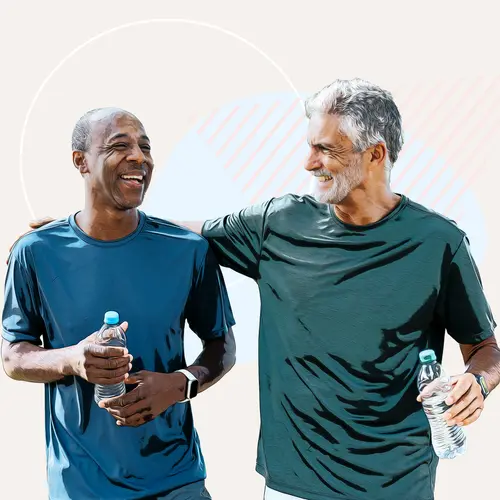Don’t let anyone tell you the glory days of sports are behind you. There’s the weekend pickup game. An occasional round of golf. And the company softball tournament is next month. You’ve still got it!
If you’re not careful, though, you could hurt yourself. Basketball, softball, and golf injuries sent more than 18,000 men ages 40-55 to emergency rooms around the nation in 2013.
You don’t have to be one of them this year.
Plan Before You Play
“You're going out there and doing something on the weekend that you don't consistently do. Go there with that mind-set,” says R. Amadeus Mason, MD, assistant professor of orthopaedic surgery and family medicine at Atlanta’s Emory University.
Take time during the week to make some of the movements specific to the sport you’ll be playing, Mason says. Throw a ball. Swing a bat or a club. Do some jumping jacks.
“The key is not trying to do too much too quickly,” says Jordan Metzl, MD, a sports medicine doctor at Hospital for Special Surgery in New York.
If you don’t want to spend part of the weekend in the emergency room:
- Be a little active during the week.
- Learn to do your sport right.
- Accept that you can’t do it all.
- Raise your exercise level slowly.
Set Limits
Once you get on the playing field, be ready to pull back. You can’t do all the things you used to. So don’t even try. Even pros cut back on other sports so they won’t get injured.
If you’re going to play in a softball tournament and you don't do it regularly, don’t play one that’s 3 days in a row, Mason says.
Many guys try to pack too much workout into too few trips to the gym. Pros build up their training and slowly boost their activity levels, says Kenneth Mautner, MD, an assistant professor in orthopaedics at Emory. “They don’t just jump into things without proper conditioning.”
They also hit the weights hard -- something you might think twice about. Metzl says to lift fewer pounds and do more repetitions. Stay away from the heavy weights, and check with your doctor if you have any health problems that might get worse if you strain to lift.
How you do it matters, too. Take it slow. Avoid sudden bursts of movement like the clean-and-jerk lift, Mautner says. And ask a trainer before you pick up a kettlebell. They can hurt your shoulders and back if you don’t use them right.
Warm Up Wisely
It’s important to get your muscles ready just before game time, no matter how many workouts you get in prior to the big weekend.
“A good warm-up can lessen your chances of injury,” says Matt Gammons, MD, first vice president for the American Medical Society for Sports Medicine.
It just might not be the kind of warm-up you’re used to. Those “static” stretches you used to hold for 30 seconds right before an activity don’t help you do better or keep you from getting hurt. They may even increase your chance of an injury.
It’s OK to loosen up your shoulder joint before you throw, though, Mason says.
“I’m a big believer in what I call the dynamic warm-up,” Metzl says. He recommends exercises like jumping jacks, jumping rope, a light run, or lunges right before the game. These activities warm your body and muscles and improve your performance.
“You see a lot of football players do that -- you know, high knees, swinging arms back and forth, doing some stretching but more with motion involved,” Mautner says. It’s safer and causes less damage to your soft tissue.
Listen to Your Body
Once you’re into the activity, know when to stop.
Pain means don’t do that anymore. It’s telling you you’ve done something wrong, Mason says. And “soreness after an activity tells you you’re not used to doing it.”
It’s not always easy to tell if you’re just a little sore or injured. Can you put weight on that foot, ankle, or knee? Can you grab an object with that hand or use that wrist without pain? If not, get it checked out.
Have a doctor examine you if your injury changes the way your body moves, Metzl says.
“If you need to go to the emergency room or see a doc in the box, that’s fine,” Gammons says. “Just make sure you get in touch with your primary care physician or someone who specializes in sports medicine the next day.”
That way, you’ll be ready to go the next time glory calls.

